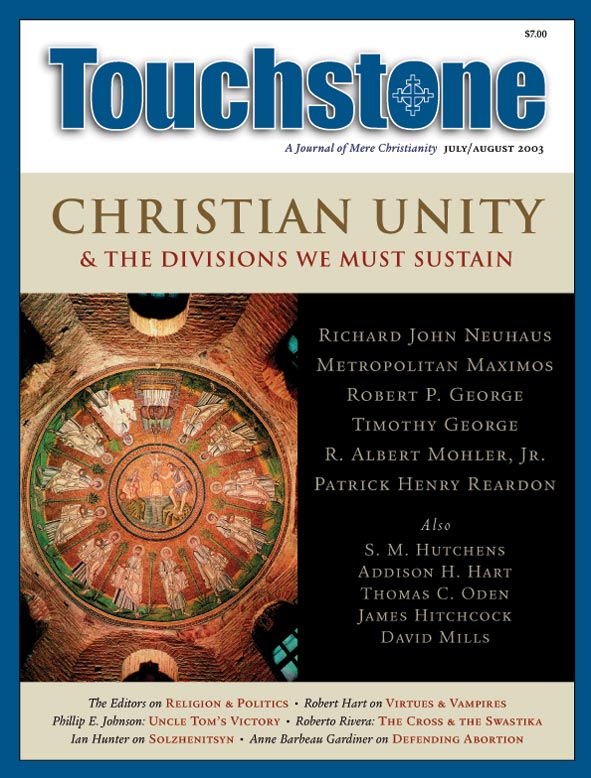Episcopal Duties
Many subscribers to The Weekly Standard recently learned about Touchstone by reading Jeremy Lott’s brief but very positive review of Creed and Culture: A Touchstone Reader, edited by James M. Kushiner. In the course of that review, Mr. Lott offered a description of our journal’s style: “The Touchstone crew’s reflexive response to liberalism—social, philosophical, or theological—is to beat the stuffing out of it.”
Really? Touchstone aggressive? Goodness, and here all along we imagined ourselves bending over backwards to be sensitive, gracious, and kind. Indeed, we virtually preen ourselves on the point. True, we do admit that, on some few and rare occasions we have, maybe, with pained reluctance, modestly lamented certain passing or incidental aspects of popular culture, pointed a tentatively censuring finger, as it were, at the liberal leanings of some church or other, perhaps softly whispered this or that faint disparagement of this or that government policy, and, more recently, ventured a vague and gentle sigh of disapproval with respect to a particular political party (which party our native modesty forbids mentioning again by name). Yes, we have done these things, perchance, but we were always so careful and cautious about doing them in the mildest, most deferential terms. Touchstone is nothing if not nice.
No such necessity, however, constrains us in the present instance, because Touchstone has of late discovered a few new heroes to praise, which we here proceed to do with relish and enthusiasm. As it happens, all three of these heroes are Roman Catholic bishops, and since we have occasionally been a bit hard on some Roman Catholic bishops in the past, we hasten now to redress an imbalance.
Our first commendation is for Joseph Cardinal Ratzinger, the Secretary of the Vatican’s Congregation for the Doctrine of the Faith. Acting as head of that important agency, charged in a special way with the oversight of Roman Catholic teaching throughout the world, Cardinal Ratzinger issued a “Doctrinal Note” on January 16 of this year, dealing with the possible conflict a Christian conscience may perceive between public policies and personal moral convictions. The most important line in that “Note,” we believe, is this assertion: “A well-formed Christian conscience does not permit one to vote for a political program or an individual law which contradicts the fundamental contents of faith and morals.” Cardinal Ratzinger declared, in short, that a Christian is not justified in conscientiously holding certain moral convictions in private while publicly and politically espousing programs and laws contradictory to those convictions. Although we suspect that the cardinal derived this insight from some other source, we do modestly mention that Touchstone has been saying this for years.
Our second commendation is for Bishop William Weigand of the Roman Catholic Diocese of Sacramento. Acting on the principle enunciated in Cardinal Ratzinger’s “Note,” Bishop Weigand earlier this year issued a public and stern pastoral warning to the Governor of California, Gray Davis, who claims to be a “pro-choice Catholic.” Bishop Weigand, explicitly rejecting a separation of public policy from personal morality, commented to his flock in California on the situation of Governor Davis: “As your bishop, I have to say clearly that anyone—politician or otherwise—who thinks it is acceptable for a Catholic to be pro-abortion is in very great error, puts his or her soul at risk, and is not in good standing with the Church. Such a person should have the integrity to acknowledge this and choose of his own volition to abstain from receiving Holy Communion until he has a change of heart.”
We have nothing but good to say about Bishop Weigand’s stance in this matter. Indeed, we are delighted to find a pastor taking seriously the prophetic example to stand before the powerful and proclaim, “Thou art the man!”
Our third commendation is for Bishop Robert Carlson of the Diocese of Sioux Falls, who recently directed Senator Tom Daschle of South Dakota to stop identifying himself as a Roman Catholic in the official congressional biography and other publications under his control. Although this directive was issued privately, it quickly became public through channels unknown. The news came as no surprise, however, nor is the motive of the directive in doubt. In 1997 Bishop Carlson publicly criticized Senator Daschle’s abortion policies in Congress, and his recent directive is correctly interpreted in the light of that earlier criticism.
It is our view at Touchstone that the authority given to the Church, the authority to bind and to loose, was intended by Christ our Lord to be actually used, not to sit on a shelf someplace gathering dust. Surely, that ecclesiastical authority can be abused by arrogant churchmen, and it has been abused on very sad occasions in the past. The actions of these two American bishops, nonetheless, appear to us entirely proper and wise. Governor Davis and Senator Daschle have publicly demonstrated support for laws authorizing the murder of unborn children, the modern version of Moloch-worship. If such men insist on calling themselves Christians, it is the plain duty of their pastors to contradict them. And the contradiction should be equally public. We are happy to commend all three of these bishops for making that clear.
And, with the modesty befitting the editors of a simple Christian magazine, we invite all Christian pastors to mark and pursue the example of these men. We urge the episcopal pastors of Senator Edward Kennedy of Massachusetts, for instance, Mayor Richard Daley of Chicago, and Representative Nancy Pelosi of California to take these matters to heart.
But why only the Roman Catholics? Alas, we are not aware of a single authoritative word of episcopal reproach to the many politicians among the Eastern Orthodox in this country who openly and energetically support abortion. How is it that Senator Olympia Snowe of Maine has not yet been publicly warned by her bishop about the hypocrisy of claiming to be an Orthodox Christian while continuing to vote against unborn children on every occasion (even voting against the recent partial-birth abortion prohibition)? When is Senator Sarbanes of Maryland, a leading lay figure of the Greek Orthodox Church, going to be told that he should not approach Holy Communion if he continues his support for this heinous crime? How long must we wait before an Orthodox bishop issues a similar directive to Governor Blagojevich of Illinois? The continued public claim of these politicians to be members of the Orthodox Church constitutes a plain and public scandal, which, as simple Christians, we humbly invite their bishops to correct.
A full recital of such pastoral negligence would not be endless, but it would be long. It seems reasonable to single out the Roman Catholic and Eastern Orthodox churches in respect to this responsibility, because these two institutions make such large claims to authority, including authority over consciences. Our comments certainly have a wider application among Christian churches, however. Whoever is charged with the proclamation of God’s Word and the pastoring of God’s people is similarly enjoined to “reprove, rebuke, exhort with all longsuffering and doctrine” (2 Tim. 4:2). Apostles, bishops, and other pastors in the past, at peril to their very lives, have stood their ground before emperors and kings. There is no reason for a bishop or any other pastor in the United States of America to quail before those who must in due course stand for re-election. Such timidity would not be very . . . well, nice.
Patrick Henry Reardon is pastor emeritus of All Saints Antiochian Orthodox Church in Chicago, Illinois, and the author of numerous books, including, most recently, Out of Step with God: Orthodox Christian Reflections on the Book of Numbers (Ancient Faith Publishing, 2019).
subscription options
Order
Print/Online Subscription

Get six issues (one year) of Touchstone PLUS full online access including pdf downloads for only $39.95. That's only $3.34 per month!
Order
Online Only
Subscription

Get a one-year full-access subscription to the Touchstone online archives for only $19.95. That's only $1.66 per month!
bulk subscriptions
Order Touchstone subscriptions in bulk and save $10 per sub! Each subscription includes 6 issues of Touchstone plus full online access to touchstonemag.com—including archives, videos, and pdf downloads of recent issues for only $29.95 each! Great for churches or study groups.
Transactions will be processed on a secure server.
more from the online archives
calling all readers
Please Donate
"There are magazines worth reading but few worth saving . . . Touchstone is just such a magazine."
—Alice von Hildebrand
"Here we do not concede one square millimeter of territory to falsehood, folly, contemporary sentimentality, or fashion. We speak the truth, and let God be our judge. . . . Touchstone is the one committedly Christian conservative journal."
—Anthony Esolen, Touchstone senior editor









